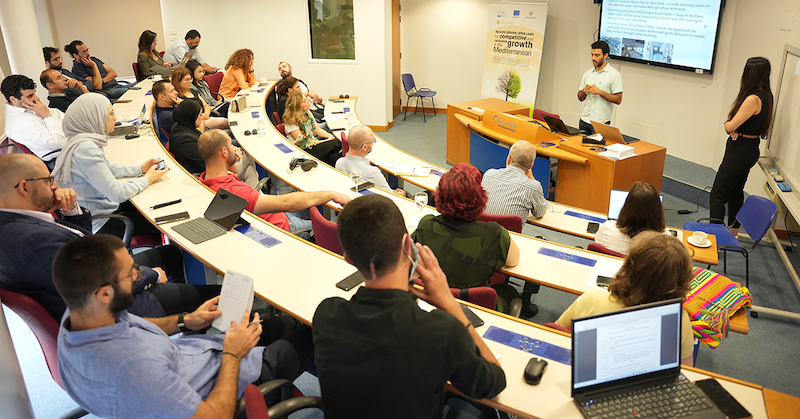Launching of the NEX-LABS NEXUS Driven Community For Water, Energy and Food in Lebanon
The Living Labs are a great initiative being brought forward to Lebanon and the region under the NEX-LABS project, that intends to establish an open space that brings together scientists, industries, society, and business communities that are NEXUS-driven to collaborate, innovate and co-create the future of the Water, Energy and Food (WEF) -NEXUS sector.
On June 7, 2022, a summit was held at Berytech Mar Roukoz, gathering 20 stakeholders coming from NGOs, academia, entrepreneurship, and the public sector in the field of WEF-NEXUS to discuss the strategy for developing a sustainable NEX-LABS Living Lab that tackles the challenges faced in Lebanon in the WEF sectors.
The Importance of a Living Lab
A circular conference was held during the launching of the Living Labs, discussing the challenges and opportunities of the WEF Nexus sector, showcasing the current reality, research, innovations, and new trends of the WEF–NEXUS field in the Middle East/North Africa (MENA) region.
Dr. Nadim Farajalla, Program Director at the American University of Beirut – Issam Fares Institute (AUB-IFI), introduced and defined the WEF–NEXUS Living Lab as a new methodology to support ecosystem actors to co-design solutions addressing WEF–NEXUS challenges. The Environmental and Sustainable Development Unit at the American University of Beirut presented and discussed their current living labs across Lebanon.
Key Takeaways
The WEF-NEXUS challenges faced in Lebanon and the world are due to climate change and population growth, overconsumption of water due to the agriculture sector, and increased energy footprint. The current management in place for the water and energy sectors does not account for it being cross-sectorial.
While the WEF-NEXUS has become a buzz term that is applied haphazardly in Lebanon, the technical implementation is facing challenges due to the absence of precise and uniform data and the inconsistent decision-making is due to the difference in lifecycle perspectives for the three main NEXUS nodes.
Meanwhile, opportunities in Lebanon and the world are increasing for three main reasons: price, security, and funding. The price of food and commodities is increasing, similar to agri-chemical products, creating a demand to produce agri-chemical products at a lower price.
The COVID-19 pandemic and the war between Ukraine and Russia showed the importance of water, food, and energy security, as the supply of food and energy was destabilized. At the same time, international bodies are encouraging the WEF-NEXUS approach by providing funding for initiatives.
In Lebanon, the Ministry of Energy and Water with the Ministry of Agriculture need to develop common strategies in the WEF-NEXUS, creating policies that are inclusive, holistic, and science based.
Scenario Planning & Networking
The main objective of the scenario planning exercise moderated by Tina El Boustany, Head of Grants and Financial Controls - WE4F MENA at Berytech, was to work on proposing solutions to successfully design, make use, and sustain a WEF–NEXUS Living Lab in Lebanon.
The main outcomes of this session were to work together towards creating and developing regulations and policies, increase the commitment of user engagement based on creating value for citizens and highlighting the benefits of the Living Lab, create a strong brand image of the Living Lab, which will be recognized as a pillar entity for the Water, Energy Food Nexus, piloting the projects to filter innovation and keep the trust of investors.
A NEX-LABS Entrepreneurs Corner Space was available for NEXUS stakeholders to meet and share common challenges faced in Lebanon and the opportunities present. The networking session was to encourage synergies when discussing demands and offers to face NEXUS challenges.








